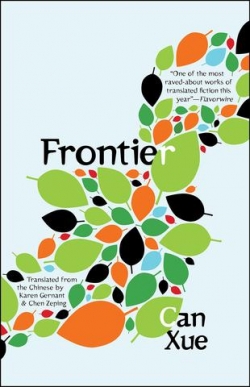Frontier
by Can Xue, translated by Karen Gernant and Chen Zeping
reviewed by Yun Ni
In China, Can Xue’s literature enjoys high esteem and popularity, but while readers embrace her works as philosophically profound, they stand in awe of their obscurity. Can Xue experiments with the Chinese language to ventriloquize western modernism, which reads in Chinese as abstruse. However, an interesting thing happens when Can Xue is translated into English: the “foreignness” which defamiliarizes her Chinese writing disappears in the English translation. In other words, what is exotic in Chinese turns out to be natural in English.
Spatial and temporal disjointedness in Can Xue’s novel Frontier, newly translated by Karen Gernant and Chen Zeping, gives rise to Borgesian moments of imagination redefining reality. This ambitious book aspires to refashion the Chinese language to explore interiority and subjectivity, establish transnational authorship, and enter the conversation of world literature.
Without a frame tale or a consistent narrative voice, the book is a montage of stories told from different characters’ points of view. Frontier’s opening flirts with the prospect of an affair between a young woman selling cloth in the market (Liujin) and her frequent customer, but refuses to dwell on it: the narrative dives deep into the woman’s mind while her train of thought drifts away across time and space. The seemingly scattered plots defy standard narration, but the quest for the self puts a new spin on each story within a story.
In Pebble Town at the foot of Snow Mountain, generations of immigrants take on traits from this liminal space. Their fragmented identities mirror each other until they are almost lost in each other: The newborn baby Liujin turns out to be her mother’s past self, “a wisp of smoke” from the left-behind hometown; the adolescent Liujin terrifies her father when the latter doubts the solidity of the girl’s shadow; the grown-up Liujin fantasizes that a black man’s body diminishes to a shadow and reveals a colorful African field. In these intensely lyrical moments, the space and the characters blur into each other. Rather than a static background for humans and animals to stage their lives, Pebble Town with all its flora and fauna is a character, mingling with all the living beings. The quotidian and the sublime bleed into one other in Can Xue’s narrative labyrinth.
Can Xue’s playfulness with subjectivity becomes all the more pronounced in the English translation. For instance, a seamless fusion between the sentient and the insentient, the subject and object, the body and space often arouses desires and temptations. Liujin deepens her affection for Mr. Sherman because “he and the chair fused into one. He harmonized so perfectly with it that it was as though this burly middle-aged man had grown into the chair,” but her passion wanes when he removes his thick glasses to wipe them and the two lenses sway in the moonlight, “gleaming like bewitching mirrors.” When the glasses cease to be part of Mr. Sherman’s body and start to recreate themselves as mirrors, the girl’s desire vanishes. Likewise, Liujin’s mother awakens “a long dormant urge” in old Qiming because “the moment she entered, she had fused into one with this room.” Can Xue details the tension between the body and space, and the ability of the body to merge with its surroundings seems to generate a disarming sincerity.
The translators are committed to adding this book to the canons of world literature, but some accommodations to the English-speaking audience erase original intent. Adaption of some Chinese names to English, for instance, Liujin’s parents Nian Si (年思) and Hu Shan (胡閃) into Nancy and José, introduces new ethnic identities unrepresented in the original and reduces the complexities of the characters’ personalities embodied in their Chinese names. Nian Si (年思), which literally means “Year Thought,” hints at the woman’s frequent loss in her long train of thought, which renders her almost bodiless, “as if the bones have been pulled out of her body.” Hu Shan (胡閃) denotes flashes of thoughts, as is exemplified in his momentary hallucination of his daughter’s disintegrating shadow. A few notes explaining the loaded Chinese names might have preserved the connotations better than replacing them with homophonous English substitutes.
As a whole, this does not detract from Gernant and Zeping’s highly accomplished translation. Rather, Can Xue’s Frontier gains new life in English, and will be of significant interest to students and scholars of world literature as well as to the curious general reader.
Published on April 21, 2017

